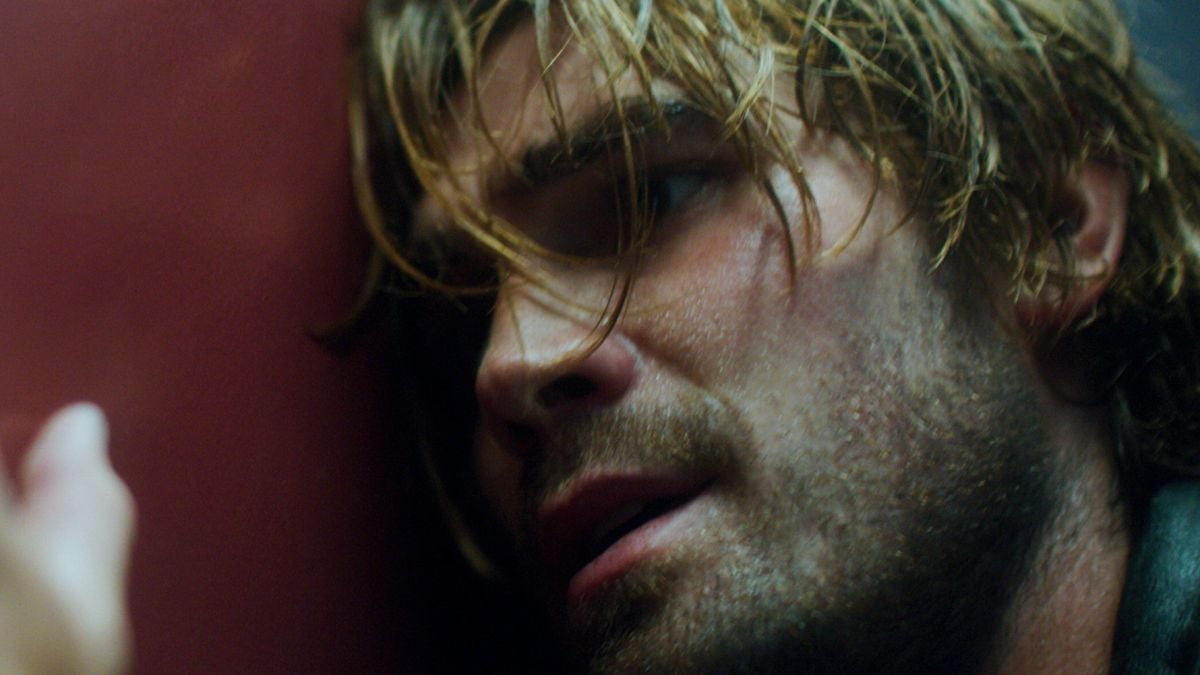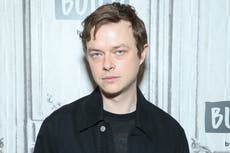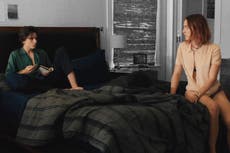The new pandemic thrillers – too close for comfort?
Lockdown sci-fi Songbird is the latest in an outbreak of Covid movies – Clarisse Loughrey asks if it's just too soon


Songbird, out now on demand, asks the question no one particularly wanted to hear: “What if things were worse than they are now?” Advertised as a sci-fi thriller, the Michael Bay-produced film takes place three years in the future, where Covid-19 has mutated into Covid-23 – a virus with a 56 per cent death rate.
The world is stuck in perpetual lockdown. Soldiers patrol the streets, ensuring that only the immune – all bearing government-issued yellow bracelets – can leave their quarantined abodes. Citizens are required to take daily temperature checks. If they fail, they’re dragged away and dumped into isolation camps, where they’re left to die or simply suffer until the illness passes. Among this carnival of horrors, love blossoms. A boy with immunity falls for a girl without it. Never was a story of more woe than this: two people determined to break social distancing rules.
The film’s director, Adam Mason, and screenwriter Simon Boyes, devised the idea last March, when Hollywood first came crashing to a standstill due to the pandemic. It was shot over the summer, becoming, ironically, the first LA film production since Covid-19 restrictions began. Cast and crew were kept small and separated, with regular testing taking place.
It was a momentous effort that, ultimately, doesn’t seem worth it. The film has been slated by critics, with Mashable’s Angie Han offering a succinct summary: “Timeliness can't create depth or insight where there is none.”
Indeed, Songbird has nothing to offer other than the quiet rustle of cheques being cashed. We don’t need reminding of every terrible, unfathomable turn the future could take – there are already decades worth of pandemic thrillers, like Outbreak (1995) and Contagion (2011), to clutter our imaginations while our own nightmare is very much in the present tense. If we had wanted to see our lives play out onscreen, the isolation of lockdown is at the heart of 2007’s I Am Legend, in which Will Smith’s character believes he’s the last survivor of a plague in New York.
Even so, it might have been easy to assume that Songbird would have a willing audience. In March, Warner Bros announced that Contagion was the most in-demand film in its catalogue, second only to the Harry Potter franchise. Perhaps it feels reassuring to see a world where scientists and public health officials are treated with the trust and reverence they deserve. Or perhaps its doomsday scenario (the virus in the film has a mortality rate of around to 20 to 25 per cent) gave people a strange way of putting things in perspective.
These films, at the time they were made, were fuelled by the unknown. But cinema doesn’t quite know what to do with itself when that unknown is now a daily, intimate reality – even if it exists without the flourish of brain-sucking zombies or A-listers in lab coats. And so, trapped within the demands of its genre, all Songbird can do is indulge in morbid fantasies and apocalyptic thinking. It’s the same approach taken by upcoming low-budget horror Safe at Home, which sees a pandemic-throttled Los Angeles transformed into a police state. But, unlike Outbreak or I Am Legend, the unwishful thinking of today’s pandemic film carries potentially harmful side effects.
Take Songbird, which frames any and all efforts to contain the virus not only as a barrier to true love, but as a suppression of human freedoms. We watch as the film’s hero, Nico (Riverdale’s KJ Apa), attempts to smuggle an infected person out of the city, with no regard for the fact he’s essentially aiding in the spread of the outbreak. And it’s the old Department of Sanitation – now gun-wielding enforcers of quarantine – who play the role of moustache-twirling villains, as their boss (Peter Stormare) froths at the mouth and yells things like “Disobedience is spreading like a tornado!” How can a film pass itself off as light entertainment when it buys so wholeheartedly into the vast, toxic misinformation campaigns that fuel anti-lockdown rhetoric?
It’s an impossible task to capture history as it’s still unfolding. Five years would pass before the first major films about 9/11 trickled into cinemas – Oliver Stone’s World Trade Center and Paul Greengrass’s United 93 – each greeted with a distinct sense of apprehension. But 9/11, for all the ripples of devastation it caused, was a singular tragedy. Here, in 2021, we’re being fed back images of a crisis that still has no guaranteed end in sight. Perhaps the all-consuming nature of Covid-19 can be blamed: filmmakers have had to watch productions shut down and indefinitely delayed; cinemas sit on the brink of collapse; and release dates are still shuffled like a pack of cards. In truth, can any of us really get through the day without thinking of the pandemic?
Our social media age has also trained us to expect an ever-looping, instantaneous response. There is no time to process, to contextualise. And so we end up with a film like Corona Zombies, in which a single actor (Cody Renee Cameron’s Barbie) is spliced into repurposed footage from Hell of the Living Dead and Zombies Vs. Strippers, two long-forgotten B movies, alongside real news broadcasts. It took only 28 days to complete, with every cast and crew member kept in isolation. Somehow, it wasn’t the first attempt to shamelessly exploit the pandemic – Corona: Fear is a Virus, by Canadian Mostafa Keshvari, was filmed and shot before the country even went into lockdown: its trailer was ready to debut by 8 March. Its story, captured in a single, 1917-esque shot, follows seven neighbours trapped in their building’s elevator. Xenophobia abounds when the Chinese woman among them (Traei Tsai) starts to cough. It’s as sloppy and unsubtle as you would expect from a film with such opportunistic origins.
There is, of course, vital work to be done here, as documentarians rush out to capture scenes of overflowing hospital wards and health workers pushed to near-inhuman extremes. Many projects have condemned the responses of their respective governments, including Alex Gibney’s Totally Under Control, released shortly before the US election. The Oscar-winning director felt compelled to act after a friend’s death from Covid-19, just as another of his circle was put on a ventilator. Meanwhile, Ai Weiwei’s Coronation and Hao Wu's 76 Days – a collaboration with Weixi Chen and a second, anonymous Chinese journalist, which was released in the UK last week – both give us a view of the frontline in Wuhan where the first case was identified. Ai had to plan his film remotely from Europe, as he’s been exiled from his home country for his political activism. Together, these films build a complex, incisive view of China’s response.
Other films, in their own way, have been able to capture something truthful of the era. They’ve acknowledged that there’s no overarching narrative in our grasp; only small, intimate experiences shared among many – fear, isolation, the sense of coming together and being torn apart. Several anthologies, including Netflix’s Homemade, the Tamil-language Putham Pudhu Kaalai (which translates as A Brand New Dawn), and Canada’s Greetings from Isolation, required filmmakers to work within the restrictions of lockdown and social distancing, in order to deliver something of the current mood. There have been the dark, the hopeful and the absurd. These short films aren’t united by a single message, but that’s their beauty – there is room for the individual in this grand, collective experience.
Host, Rob Savage’s lo-fi horror from last year, ingeniously exploits the way in which Zoom is now part of the daily fabric of people’s lives – the video calling service gets a supernatural twist when a group of friends, stuck in lockdown, decide to host an online seance. Savage had initially uploaded a short video of a real-life prank he’d pulled involving a strange rumbling in the attic; it went viral, spurring him to expand the premise into a feature-length project, all shot remotely. The film touches on ideas of loneliness, and the illusory connection social media provides, though, unlike Songbird, never in a way that feels ham-fisted or too explicit.
Then there’s Doug Liman’s Locked Down, released in the US last week and arriving in the UK later this year, which homes in on the brutalising effect the past year has had on relationships. It’s delivered against the effervescent glow of a high-stakes heist, as Anne Hathaway and Chiwetel Ejiofor play a recently separated couple trapped at home thanks to lockdown measures, who decide to gamble it all and steal a priceless diamond from London’s Harrods store.
The film was written, shot and wrapped in a few months and is bursting with cameos, since so many high-profile actors were essentially out of work. But even if the reviews haven’t been stellar, critics have conceded that it still shows a brutal honesty about the cyclical strain of endless bread-baking and stilted FaceTime conversations. As Polygon’s Quinci LeGardye notes, Locked Down might just be “the most realistic depiction of the early days of Covid”.
We’re simply not at the stage where we can process the full weight of the pandemic, but there are ways cinema can comfort and acknowledge the reality of the now – with a dash of humour, horror, or plain sincerity.
Join our commenting forum
Join thought-provoking conversations, follow other Independent readers and see their replies
Comments


Bookmark popover
Removed from bookmarks